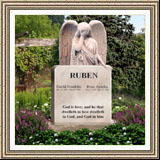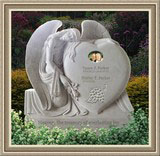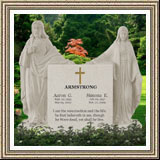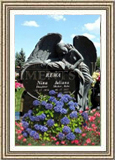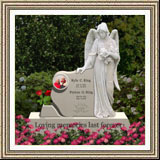|
4 Ways to Help Children With Grief
By Emily R Long
Many people feel at a loss for how to help children who
are experiencing grief - especially if we are also
trying to deal with our own grief. Any adult in a
child's life has an impact and the opportunity to help a
child handle grief - teachers, childcare providers,
neighbors, and other family members in addition to
parents.
Here are a few ways to help children with grief:
1. Honor and Affirm whatever they are feeling
I believe that one of the most beneficial things an
adult, especially a parent, can do to help children deal
with their grief is to allow the child to talk about and
express their experience and feelings without the adult
dismissing it, trying to fix it, or minimizing it. It's
hard to remember sometimes that children are amazingly
capable to coping with a variety of situations - if we
give them the chance and don't rush to protect them.
I think it's easy to forget as we grow older how
devastating and painful even the smallest losses can be
to a child. To a child losing a favorite toy or a pet
turtle, while minor to us, can be heart breaking - even
if the heart break only lasts a short time. As adults in
a child's life, it's important to remember this.
If a child is not allowed to experience or express their
feelings for the small losses in a way that is honored
and respected, we prevent them from learning how to
handle the bigger losses (death of a parent, sibling,
friend). If children don't learn the skills of handling
and experiencing their grief as children - their griefs,
big and small, may follow them into adulthood. On the
other hand, if we honor and affirm their experiences,
children can learn the skills and strengths to handle
their grief and lead happier, healthier lives throughout
their life.
2. Allow them to see your grief, pain, and tears.
There seems to be a common belief in society that to "be
strong for our kids" means we shouldn't allow them to
see our grief and pain. I think this misperception is
because of society's definition of strength. I think
this definition of strong is more harmful than helpful.
I also think there is a misperception that if kids don't
see us cry, they won't know that anything is wrong.
Sorry, folks, but kids are a lot smarter and more
perceptive than that.
Even if we try to hide our tears and our pain behind
closed doors and out of children's sight - they know.
They sense it. And they learn to do what we do - hide
and avoid their hurts. Which, as I've written about
before, does nothing to help anyone.
3. Be honest and use precise language
Often we try to sugarcoat things for kids - 'Grandma had
to go away' or 'Spot had to go to sleep for a very, very
long time." We avoid kids questions about death and
questions about what happens to Grandpa's body and
questions about how Fluffy will breathe buried
underground. I think it's important to be honest with
kids and to use the proper language - "Grandma died
yesterday" and "Spot was very sick and he died." Kids
will get upset, they will be confused and they might not
completely understand (depending on their developmental
level). What I have found though, in working with kids
as a therapist, is that most of them do better
emotionally in the long run if they are told the truth
and their questions are answered respectfully from the
start. It was the kids who were told everything was fine
or were lied to about how someone died had a much more
difficult time later.
Let me also note that I'm not saying to give kids all
the gory details about how Grandma died or what happens
with Spot's body after its buried and so on. I'm saying
kids seem to do better when their questions are answered
as honestly and openly as possible in language suited
for them at their developmental level. If you don't know
an answer or how to answer, tell them, "I don't know."
Kids are more understanding and resilient than we
sometimes give them credit for.
4. Include Children in Funeral/Memorial Services or Help
Children Create Rituals
Many times children are not included in funeral or
memorial services, particularly young children. I think
that if a child wants to attend the service, it is
important to allow them to attend. Funerals and memorial
services are important rituals that help us to say
good-bye and to receive social support.
For older children and teens, it can also be helpful for
them to participate in the discussions and preparations
for the funeral or memorial. Allowing them to contribute
to the decision making process helps give them a sense
that they are doing something to honor their loved one.
Some teens might also want to participate in the service
itself - read a letter or poem, play music, etc. I
believe it's helpful for teens to at least be given the
option to actively participate - even if they decline
the opportunity.
If it's not possible for the child to attend the service
or if it is another kind of loss (such as loss of a pet,
a friend moved away, moving), it can be helpful to
create some other kind of ritual for the child to honor
the loss or change. Kids can hold their own service for
the pet or person who died, create drawings or letters
to the friend who moved away, write a story about their
favorite memories in their old house, and much much
more. Children often easily come up with creative ideas
for rituals that will help them integrate and process
the grief they feel around the loss or change.
Emily Long is the President and Founder of International
Association of Grief Support Providers (currently in
start-up). She is a National Certified Counselor and
earned her master's degree in Community Agency
Counseling from East Tennessee State University. Emily
has worked with diverse populations in standard and
alternative mental health settings that include
inpatient hospitals and outpatient clinics, crisis
intervention, in the schools, and on a therapeutic ropes
course doing individual, couple, family, and group
therapy. She has worked with children, adolescents and
adults. |

